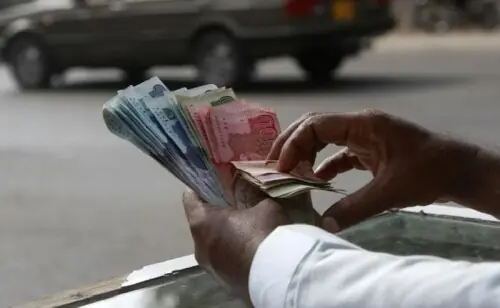KARACHI: Pakistan and the IMF reached a three-year, $7 billion aid package deal, the Washington-based institution said on Saturday morning, giving much-needed respite to the nation.
The new programme, which needs to be validated by the Fund’s Executive Board, should enable Pakistan to “cement macroeconomic stability and create conditions for stronger, more inclusive and resilient growth,” according to a statement.
Faced with chronic mismanagement, Pakistan’s economy has found itself on the brink, challenged by the Covid-19 pandemic, the effects of the war in Ukraine and supply difficulties that fuelled inflation, as well as record flooding that affected a third of the country in 2022.
With its foreign currency reserves dwindling, Pakistan found itself in a debt crisis and was forced to turn to the IMF, obtaining its first emergency loan in the summer of 2023.
The latest bailout, coming to Pakistan in the form of loans, follows a commitment by the government to implement reforms, including a major effort to broaden the country’s tax base.
In a nation of over 240m people and where most jobs are in the informal sector, only 5.2 million filed income tax returns in 2022.
During the 2024-25 fiscal year, the Pakistan government aims to raise nearly $46 billion in taxes, a 40 per cent increase from the previous year.
“The programme aims to capitalise on the hard-won macroeconomic stability achieved over the past year by furthering efforts to strengthen public finances, reduce inflation, rebuild external buffers and remove economic distortions to spur private sector-led growth,” the IMF statement said, quoting Nathan Porter, the Fund’s mission chief to Pakistan.
“In this regard, the authorities plan to increase tax revenues through measures of 1.5 per cent of GDP in FY25 and 3 per cent of GDP over the programme,” it said. The increase in revenue collections will be achieved through “simpler and fairer direct and indirect taxation, including by bringing net income from the retail, export, and agriculture sectors properly into the tax system”.
The statement added that federal and provincial governments have agreed to rebalance spending activities in line with the 18th Constitution Amendment by signing a ‘National Fiscal Pact’. Under the agreement, subjects including education spending, health, social protection, and regional public infrastructure investment will be devolved to provinces.
The provinces have already committed to “fully harmonising their Agriculture Income Tax regimes through legislative changes” with the federal and corporate income tax regimes. The move will be implemented from Jan 1, 2025.
The government will also improve the power sector’s viability and minimise its losses through timely tariff adjustment, reforms, and refraining from further unnecessary expansion of generation capacity.
“The authorities remain committed to undertaking targeted subsidy reforms and replace cross-subsidies to households with direct and targeted BISP support.”
The authorities will improve SOE operations and management as well as privatisation, in which the most profitable entities will be prioritised.
The government is also working towards “phasing out” incentives to Special Economic Zones, agricultural support prices and related subsidies, while refraining from new regulatory or tax-based incentives, or any guaranteed return “that could distort the investment landscape. “The authorities have also committed to advance anti-corruption as well as governance and transparency reforms, and gradually liberalise trade policy,” the statement concluded.
With input from AFP
Published in Dawn, July 13th, 2024


































